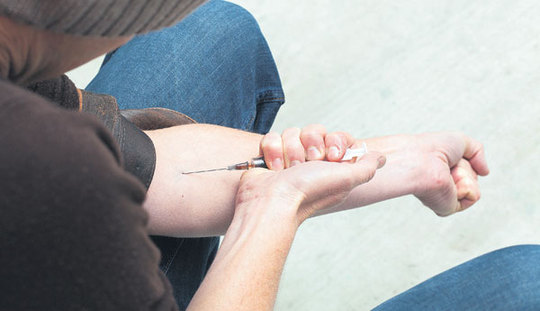Heroin still a big problem
Dublin People 17 Jul 2015
NEW figures published last week show an increase in heroin as the primary drug of choice for clients attending Coolmine Therapeutic Community.
According to its 2014 annual report, launched by Minister of State with responsibility for drugs, Aodhán Ã? RÃordáin, almost seven in every 10 women in residential therapy at the Dublin 15 centre were addicted to heroin.
Statistics for the year also reveal half the men in residential treatment also cited addiction to heroin as there major problem as well as 41 per cent of all those on the day programme.
The figures were released just days after new Dublin Lord Mayor, CrÃona Nà Dhálaigh, backed the introduction of medically-supervised injection centres for drug addicts in the city.
“I know how difficult it is to address the problem of drug addiction and the resulting consequences of addiction in the city,
? she told The Journal website.
“What is the harm in actually trying it out on a pilot basis?
?
Minister Aodhán Ã? RÃordáin also recently said he didn’t see why medical supervision of injecting should be a big issue.
Medically supervised injecting centres are also supported by the Ana Liffey Drugs Project. Director, Tony Duffin, believes there’s a need to implement interventions that focus on most harm.
“For example, there are people who, whether we like it or not, are currently injecting in public on Dublin’s streets,
? he said recently.
“However, the chances of someone in this group being able to access the residential treatment that they need is negligible, because they don’t meet the criteria for entry.
Coolmine Therapeutic Community is one of Dublin’s few residential options for addiction treatment. Last year, the centre supported 1,250 individuals in 2014 with a range of community, day and residential programmes.
Of those 67 per cent were female admissions and 49 per cent were male.
At any one time, there were 34 clients participating in the five-month residential treatment programme at Coolmine Lodge, the male residential service.
This represented a 33 per cent increase in admissions compared to the previous year. Of the 120 new admissions, 42 per cent were prison or probation referrals.
Occupancy also increased from 12 females to 24 at any one time in Coolmine Ashleigh House and the community and day services worked with 139 individuals during the year, up 11 per cent on the 2013 figure.
Chairman, Alan Connolly, said that, despite coping with an increased demand within a challenging funding environment, Coolmine maintained the highest possible standards for the care of clients.
“Coolmine’s longitudinal outcomes study found that, two years after therapy, 71 per cent of clients were illicit drug-free, 97 per cent did not engage in crime and 25 per cent were engaged in employment,
? he said
Last year also saw increased service activity in Coolmine, as it grappled to meet the presenting needs of clients from within existing resources.
Coolmine’s housing and resettlement service supported over 250 clients to access accommodation in that year. And 30 per cent of these clients got long term stable accommodation through local authority or social housing providers while 34 per cent moved in with their families or friends.
“A total of 32 mothers and 21 children were homeless or inadequately housed after completing their residential programme in 2014,
? said Pauline McKeown Chief Executive at Coolmine.
“It is a cause of concern as there is a link between increased levels of homelessness and relapse. They have no local connection to their resettled area and are not deemed priority for housing access.
?
A notable challenge for Coolmine was the development of its mother and child residential service at Ashleigh House.
A total of 67 clients were in residence during 2014, including 18 mother and child admissions and four expectant mums.
“Funding has been secured this year to increase the residential capacity from 18 to 24 women at any one time, to meet the demand for the only mother and childcare residential service in Ireland,
? McKeown said.
“In addition, the crèche facilities will be renovated to allow Coolmine to work with more children impacted by parental substance misuse on a full time residential basis.
“We have also strengthened our commitment to evidence-based treatments through the Parenting under Pressure programme (PUP) for high risk families.
?
Last year Coolmine TC also responded to increased prevalence of problematic alcohol use by piloting a Community Alcohol Treatment Programme (CATP).
It supported 28 individuals with seven in ten of them completing the programme. Coolmine hopes to secure additional funding to maintain the programme this year.











